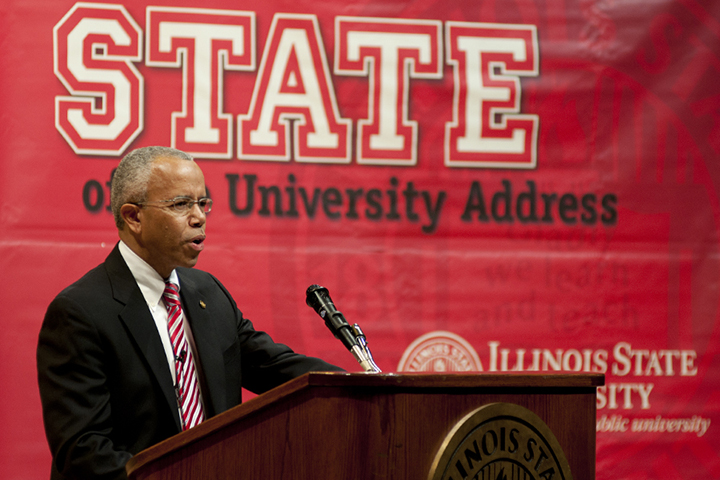Illinois State University remains a financially sound institution in spite of a weak economy, dwindling state support for higher education and uncertainty over the financial impact of pension reform.
During his State of the University Address on Thursday, Illinois State President Al Bowman said that in addition to academic excellence, financial sustainability has become an important criterion for success.
Bowman cited a Chronicle of Higher Education analysis of nearly 1,700 public and private colleges that found Illinois State to be a “financially sound institution,” at a time when many colleges are on an “unsustainable financial path” or at risk of slipping into that category. He also noted Illinois State’s A-2 bond rating with a stable outlook from Moody’s Investors Service as positive financial news.
“Clearly, Illinois State has benefited through adherence to our strategic plan and our commitment to conservative spending,” said Bowman. “We have advanced because of our popularity among high-achieving students. We have capitalized on our low debt level. Illinois State has not resorted to layoffs and furlough days. We have not shuttered residence halls due to a lack of students. We have not strangled faculty and staff development or disconnected from current technology.”
Bowman said Illinois State will continue to face economic threats in the coming year. The University’s fiscal year 2013 state appropriation totals $74.1 million. That figure is $4.8 million – or 6.07 percent less than last fiscal year – making this year’s state appropriation equivalent to state funding received in 1997.
Pension reform remains a critical issue for state lawmakers, with Governor Pat Quinn warning that state funding for higher education and scholarships for needy students could be reduced by more than $280 million over the next five fiscal years if comprehensive pension reform is not enacted. One pension reform model that shifts employer pension contributions away from the state and onto public universities would reduce Illinois State’s appropriation to $63.6 million, equivalent to what the University received in 1989.
“Whether the numbers coming out of Springfield are scare tactics, or a grim forecast, it is clear to me that the de-prioritization of public higher education in Illinois will continue unabated,” said Bowman.
Bowman announced the development of a new long-range financial plan for Illinois State to address the challenges of statewide financial troubles, the declining number of high school graduates, changing demographics and increasing competition among colleges and universities. The planning process, which will include input from the campus community, will be led by Provost Sheri Noren Everts and Vice President for Finance and Planning Dan Layzell, in consultation with Vice President for Student Affairs Larry Dietz and Vice President for University Advancement Erin Minné.
Bowman said the plan must address a number of core issues including maintaining the high-quality academic enterprise; being consistent with the University’s mission, vision and goals as articulated in Educating Illinois; maintaining the affordability of an Illinois State education; addressing operating and capital needs; diversifying the revenue base; strengthening enrollment competitiveness; and maximizing the efficiency and productivity of administrative and academic functions.
“A thoughtful, creative plan that builds on our strengths and responds to the changing landscape will allow us to continue to thrive for many, many years,” said Bowman. “Our advantage today is that we are planning from a position of strength and stability, rather than weakness, which is why I believe it is critically important for us to be proactive rather than reactive in response to our changing environment.”
Competitive faculty and staff salaries have been a high priority for Bowman throughout his tenure as president. During his address, he also announced a 2 percent merit-based salary increase for employees, effective at the end of December and retroactive to July 1.
“Although this struggling economy has forced us to readjust our compensation goals, we have made up some ground against peer institution salaries,” said Bowman. “In several classifications, we meet or exceed comparison group compensation averages.”

